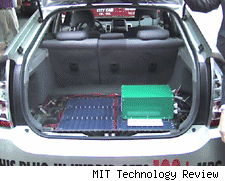 The MIT Technology Review has an article on plug-in hybrids and the electrical grid. The thesis of the piece is that wide-spread use of PHEVs, rather putting a strain on the electrical grid, could actually be beneficial and lead to strengthening of the grid over time. The idea is that these hybrids would predominantly be plugged in at night when there is less demand for electricity, than during the day.
The MIT Technology Review has an article on plug-in hybrids and the electrical grid. The thesis of the piece is that wide-spread use of PHEVs, rather putting a strain on the electrical grid, could actually be beneficial and lead to strengthening of the grid over time. The idea is that these hybrids would predominantly be plugged in at night when there is less demand for electricity, than during the day.
In order for a grid to be stable there needs to be a balance between supply and demand. If the demand is less than the supply, the supply has to be reduced either by cutting production or somehow, disposing of the over production. There is only very limited capacity for storing excess electrical energy, and some sources of electricity such as wind are inconsistent in their production. When the wind blows at night this can be used for charging cars. It's also conceivable that cars that are plugged in during peak demand periods could even provide a buffer by taking energy generated during off-peak periods and feeding some extra energy back into the grid to help balance the loads.
The night-time charging could be accomplished largely without additional generating capacity. The extra revenue that utilities receive from customers charging their cars could also be put to use in upgrading the infrastructure, which would help preserve the grid. Of course, this sort of customer usage pattern would be a disincentive to quick charging technology, and battery only vehicles. Cars that require a longer charge time would be more likely to be plugged in overnight and only hybrids would have the practical ability to feed power back to the grid and still remain operable by drivers when needed. Read the article for more information.
[Source: MIT Technology Review]


Sign in to post
Please sign in to leave a comment.
Continue